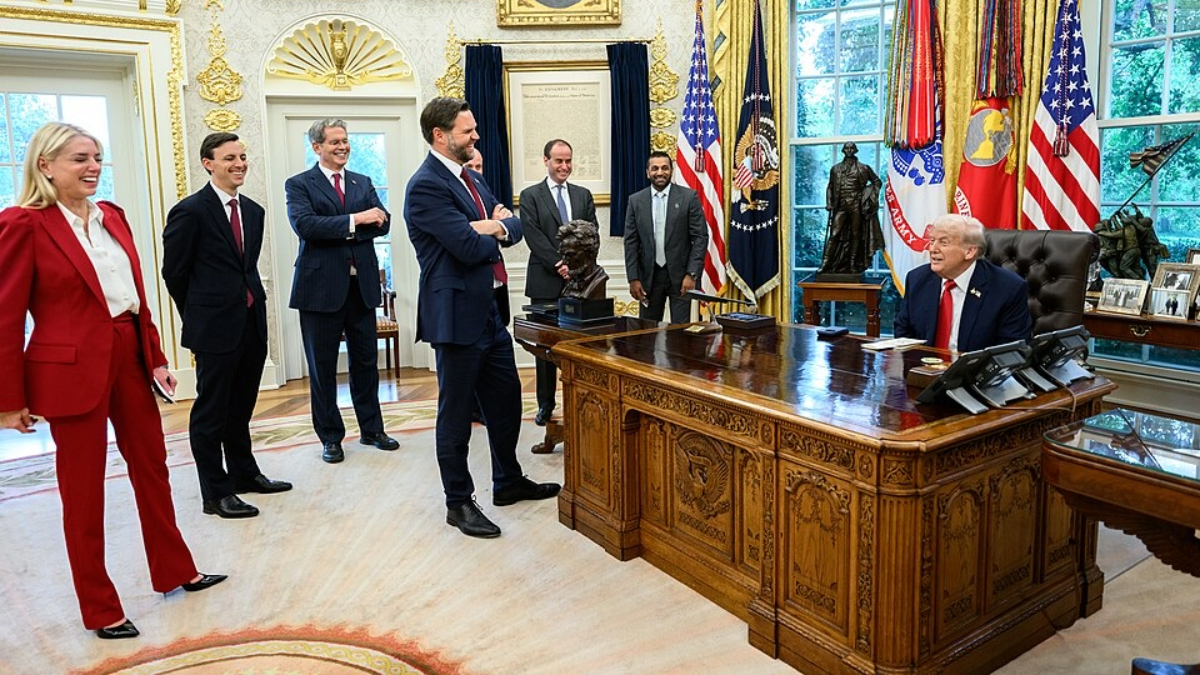Trump’s TikTok Deal Would Further Entrench Big Tech Surveillance
Jeffrey Chester / Oct 10, 2025
President Donald Trump speaks with Vice President JD Vance and others before signing an executive order greenlighting a US deal for TikTok, September 25, in the Oval Office. (Official White House Photo by Joyce N. Boghosian)
The transfer of TikTok’s United States operation to a group of Trump administration-selected controlling investors should be vigorously opposed, as it would effectively endorse the current extractive system shaping our social media platforms and most other commercial digital services.
TikTok orchestrates its social media marketing business in the same ways that Meta and Google do — harvesting our data, leveraging the power of the now ubiquitous generative artificial intelligence products, closely partnering with the most powerful global brands, ad agencies and adtech companies and enabling an array of human and virtual influencers — all to generate the mechanisms of “engagement” that are the core of the commercial surveillance monetization model for our digital media.
How are we ever to reform our country’s current digital media giants — as well as the AI behemoths lined up to become new, ad-saturated marketplaces — if our government uncritically sanctions the current business model?
A US TikTok should be required, at the very least, to operate its data practices in ways that really protect privacy, shield users from manipulative and unfair marketing tactics, adopt accountable generative AI applications, and serve in ways that strengthen our democracy, including by promoting civic discourse, civil rights and diverse viewpoints.
While such proposals may appear to be digital “pie in the sky” aspirations at this perilous political moment, the transfer of TikTok’s US ownership and its connections to recent and pending mega-media mergers is precisely the moment to make our views known and put up a fight.
Of course, the debate over TikTok here has focused on owner ByteDance’s relationship with China and the concern that its autocratic government will surveil and target Americans.
While that’s a legitimate issue, Google, Meta, Amazon and many other digital media companies are as serious a threat to us personally and collectively. They are all conducting far-reaching data surveillance on Americans (and people worldwide), unleashing algorithms and online content designed to profoundly influence what we think, do and consume. Disinformation on these platforms is not only abundant but supported. As we saw with the Cambridge Analytica privacy scandal and elections in the US and in Europe, US-based platforms can easily be manipulated by foreign and other actors. There are still endless headlines about the latest social media-inspired tragedy — from individual acts leading to suicide and violence to the promotion of hate and even genocide — which sadly illustrate why our digital media system is in desperate need of transformative change.
The Trump administration’s unleashing of generative AI technologies, which are now used by our platforms to accelerate and deepen the impact of their commercial surveillance marketing, is hurdling our digital media system to gather and analyze even more information on us and more efficiently deploy it to better sell, influence and direct our behaviors.
There is another looming problem with US President Donald Trump’s TikTok plan — the expansion of MAGA-influenced media control over that platform, as well as leading news services, streaming video channels, broadcast stations and media production studios. In particular, this would be the likely role played by Trump ally and the billionaire chair of Oracle Larrry Ellison. Transferring key TikTok assets to be managed by Oracle is key to the White House’s plans.
As we know, Ellison’s deep pockets enabled his son David recently to acquire Paramount/CBS. There have already been a number of troubling concessions to the Trump administration to get the deal through, including installing a politically conservative ombudsman at CBS News, acquiring the Free Press website and tapping its founder Bari Weiss to lead CBS’s newsroom.
Next on the agenda are the Ellisons’ buying Warner/Discovery/CNN. Their potential control over two major news operations — which would likely see layoffs and staff purges — could provide Trump and his allies greater ability to shape the information narrative to their benefit. A combined Paramount/Warner would also provide the Ellisons’ a slew of streaming video, cable and broadcast channels (including sports and animation), film production facilities, adtech operations and more. Imagine all these media properties, including TikTok, acting synchronously, supporting a MAGA agenda that leverages the massive data gathering and targeting power of contemporary digital platforms to reach individuals and influence their political perspectives.
Given Oracle’s considerable business interest and expertise in digital data used for marketing, its “oversight” of a US TikTok algorithm will not lead to better privacy and consumer protections for Americans. Ellison’s Oracle has long provided a host of data tools for digital marketing, and has also added numerous generative AI tools to advance it. The company touts its ability, for example, “to create a connected and personalized experience,” including by combining “online, offline and third-party data with AI and machine learning.” According to reports, ByteDance will still control TikTok’s e-commerce and advertising business in the US. This means that the numerous global and US-based advertisers who have found significant success exploiting TikTok will continue to operate in a business-as-usual manner, able to purchase advertising and influence relatively seamlessly across the globe. Given that access to data is central for this key revenue generator, how exactly will Oracle and ByteDance work together to keep TikTok’s more than $16 billion US revenues flowing? This question demands answers now.
There are an array of policy issues that can be used to challenge Trump’s TikTok scheme, helping publicize the need to reforming US digital media and also potentially slow down the final transfer of ownership, including numerous data privacy and consumer protection issues. The Ellisons’ takeover of Paramount/CBS also involves significant data gathering by its streaming video channels, for example. The antitrust implications should be reviewed to address the impact on competition involving TikTok, Paramount/CBS, Warner/Discovery/CNN, Oracle and its many clients.
There should be challenges filed at the Federal Trade Commission, Department of Justice and state attorneys general, as well as public hearings on what this means for consumers, creators, young people, journalism and the institutions supporting democratic discourse.
A raft of other questions should be raised, including about the proposed set of TikTok’s owners and their own involvement with China and other potential conflicts. For example, Oracle has recently brokered a “gigantic contract” with Chinese-ecommerce company Temu. It is also profiting from serving as TikTok’s cloud computing provider. However, the company is currently experiencing a cash flow problem, according to Bloomberg, and has announced layoffs, raising questions about whether Trump’s TikTok deal is also designed to financially boost an ally.
Oracle’s recent expanded alliance with Google to offer that company’s most advanced Gemini AI services on its cloud illustrates the web of digital partnerships that undermine competition and increase the prospects of greater data harvesting. Silver Lake Partners, one of the other proposed US investors, has invested in numerous Chinese companies, including one accused of facilitating surveillance on the ethnic Uyghur community there. Abu Dhabi-based MGX, an AI-focused investment company that is being rewarded a US TikTok ownership role and is supporting Trump’s “Stargate” AI initiative here, has a range of financial relationships, including with Elon Musk and OpenAI, which require scrutiny as well.
I was among the digital rights advocates working in Washington, DC, in the very early 1990s as the world wide web became ad supported and commercialized. Our NGO (then called the Center for Media Education) was one of the very few to oppose the role that data tracking would play in delivering targeted marketing. Industry lobbyists and their political allies were successful in making sure there were no impediments to extensive data-mining online — which is why today we still don’t have a federal consumer privacy law.
If the internet has an “original sin,” it was allowing the major platforms, their brand advertiser and data-broker partners successfully to transform the internet into a highly centralized and powerful apparatus designed to place the interests of marketers and their oligopolistic platform collaborators ahead of the needs of a civil and equitable society.
We are at a critical moment today — just as important as those early days. Generative AI has been rapidly adopted across our digital, industrial and marketing sectors. It is accelerating the capabilities of the commercial surveillance model and, through partnerships and alliances, allowing our current leading online giants and a few newcomers to be among the dominant players.
The proposal to allow Trump’s political allies to operate TikTok in the US, without significant reforms and safeguards, as well as likely permitting a MAGA media industry trifecta provides a much-needed opportunity to articulate an alternative vision for US digital media. One reason we have ended up with the current crisis, I believe, has been the historic and collective failure to articulate and support communications policies that would have helped our democracy better thrive. With Trump’s September executive order giving the “divestiture” 120 days to finalize, now is the time to use all our resources — including on TikTok and other social media — to offer a better and alternative outcome.
Authors
